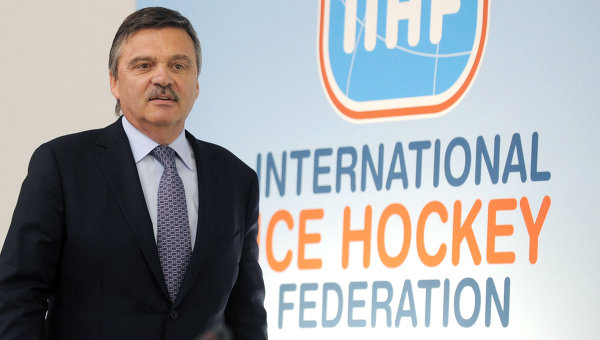
World Hockey Championships 2014: Minsk or elsewhere?
Publication: Eurasia Daily Monitor Volume: 9 Issue: 93
By:

On May 14, 28 members of the US House of Representatives appealed to International Ice Hockey Federation (IIHF) President Rene Fasel not to hold the 2014 world championships in Minsk. The politicians argued that the people of Belarus lack basic civil rights, that the situation inside the country has deteriorated significantly since the honor to host the championship was awarded to Belarus in 2009 and that the “unrestrained climate of repression” creates a concern for the safety of players, coaches and fans who will attend the event (Charter97.org, May 14).
The appeal is the latest of several to Mr. Fasel and raises the question whether sports and politics should mix, whether the singling out of Belarus is justifiable and perhaps – just as fundamentally – whether the holding of the event in Minsk would add prestige and popularity to the regime of Alyaksandr Lukashenka. It is a topic on which there are no obvious answers but to which considerable thought needs to be given.
The hockey championship is scheduled to take place on May 9-25, 2014 in Minsk. Belarus received 75 votes in favor of it hosting the event, well ahead of Hungary with 24, Latvia – 3, and Ukraine – 3. To secure the hosting rights, the Belarusian side promised to expand the current hotel space in Minsk by about 5,000 people (the largest hotels and the only ones of international standard currently are Evropa, Minsk, Crowne Plaza and Viktoriya) by 2013. The country is also making all its major roads four-lane highways and had promised that all visitors to the championships will be allowed to enter Belarus without visas (https://www.belarus.by/en/about-belarus/sport/iihf-world-championship-2014).
After the repressions and imprisonment of political prisoners that followed the controversial elections of December 19, 2010, many countries and internal opposition groups have expressed reservations about the award to Belarus (see CivicBelarus.eu, Mar 19). It has been noted that the president uses ice hockey as a propaganda device and that the country’s sports associations are monopolized by his cronies – all of whom also are involved in the construction plans that are worth millions of dollars (EU Observer, May 21, 2011). Swedish newspaper Svenska Dagbladets editorialized that it would be disgraceful to have the championships hosted by “a dictatorial country” and preferable to move the tournament to Sweden and Finland, the hosts for 2012 and 2013 (Charter97.org, May 4).
In the German parliament, a new draft motion backed by Social Democrats and Greens has requested that the German Ice Hockey Federation should formulate a plea to the IIHF to find an alternate host (Der Speigel, May 3). A week later, the Center for European Policy Analysis and Freedom House also sent a letter to Mr. Fasel, calling on him to suspend plans to hold the event in Belarus. The letter, which is signed by 23 US and European policy experts, leaders of pro-democracy NGOs, and some European parliamentarians (including the former Czech international and NHL star Peter Stastny), cited the gross violations of human rights in Belarus, the crackdown since the elections, the regime’s continuing incarceration of several political prisoners, and the issue of “basic human dignity.” It notes the precedent of 1969, when the championship was moved from Czechoslovakia to Sweden to protest the repression of the 1968 Prague Spring movement (cepa.org May 10).
For his part, Lukashenka has stated that sport should not be political and that he would be “strongly offended” if the championship was taken away from Belarus (Telegraf.by, May 8). Rene Fasel had stated earlier that he would not change the location and that the IIHF observes “strict political, racial and religious neutrality” (Der Spiegel, May 3). The groundswell of protests may have some impact on his position.
The protest coincides with a growing EU movement led by Germany for a leaders’ boycott of the Euro-2012 soccer championships in Ukraine (but not of events in the co-host country, Poland). German Chancellor Angela Merkel declared that Ukraine was, like Belarus, a dictatorship and that people in both countries were suffering as a result (Financial Times, May 10). The German concern was prompted by the continued incarceration of former Prime Minister Yulia Tymoshenko as well as several other former government leaders and activists.
The first question is whether such comments are accurate. By any standards, Belarus is an authoritarian regime under a harsh leadership, but it is not a dictatorship – more obviously, neither is Ukraine. Belarus, however is hardly unique in its abuses of human rights. Germany has close and cordial relations with Russia, which also has political prisoners, but there have been no EU calls for a boycott of the forthcoming winter Olympics in Sochi (also 2014). Nor were there demands to boycott the past summer Olympics in Beijing. When such boycotts have been enacted in the past – for example, the Summer Olympics in Moscow (1980) and Los Angeles (1984) by the United States and the Soviet Union, respectively – they proved ineffective because of the marked lack of unity among the protesting nations.
Second, should one assume that the championships would benefit the Lukashenka regime? The presence in Minsk of numerous foreigners as well as international hockey teams could have a galvanizing impact on the urban population as well as the political opposition. For the first time in many years, people could mix freely with foreigners for a sustained period. The construction work involved would provide jobs and better salaries for Belarusian workers. Those currently prevented for political reasons from leaving the country would benefit from the more open atmosphere during the event. It is presumptuous to assume that by moving the games, the protesters are supporting the rights of the Belarusian people. Rather, they would isolate them further; cutting off contact is not usually the best means to affect political change.
Third, Belarus is a small hockey nation, hardly comparable to giants such as Russia, Canada, Sweden or Finland. The event is not going to be a triumphal occasion like the Moscow Olympics at the height of the Cold War.
Lastly, and it is an obvious point, the repressions in Belarus target the opposition. They are discriminatory and should indeed be condemned. In general, the streets of Minsk, as far as foreign visitors are concerned, are among the safest in Europe – ironically, perhaps, because of the heavy police presence. The likelihood of a mugging or assault is much lower than in most US cities, and particularly Washington, DC – the source of the protest by the 28 congressmen. The motives behind the protests are honorable, but the campaign needs to be rethought. There are both drawbacks and advantages to holding the 2014 event in Minsk, and there are inconsistencies in the reasoning behind the petitions. The main impetus is disgust for Lukashenka and his regime; but there are other, broader issues to consider.




